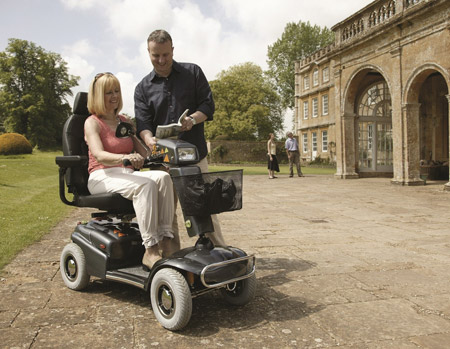Questions to ask when buying a mobility scooter
A mobility scooter is a sizeable investment, whichever end of the market you’re looking. Even the most basic models tend to cost a few hundred pounds, and, at the other end of the scale, the most capable machines can cost thousands. It pays, therefore, to make sure you know what you’re getting.

As well as carrying out your own research, which will be helped by our dedicated guide, it's well worth talking in detail with the dealers you come across. But what do you ask?
Below are some questions to start with. Any reputable seller should have no trouble answering them for you.
Can I test drive the scooter?
All mobility scooter models are different in one way or another, so it's impossible to know whether one is right for you without getting on and having a go. Test driving is an essential part of choosing a vehicle, so don't be afraid to try as many models as you feel is necessary before settling on one.
No dealer should be afraid of letting you test drive one of their scooters, so if your question is met with anything other than an enthusiastic 'yes, of course', it's probably worth continuing your search elsewhere.
It may be possible to have a scooter brought to you so you can test drive at home, so consider this if you think getting to the showroom might prove difficult.
What warranty does it come with?
Like cars, mobility scooters can stop working properly if components are faulty or worn. This is why it's important to have a warranty in place on any scooter you buy, regardless of whether it's new, refurbished or second-hand.
With the right protection in place, you'll be covered in the future should anything go wrong – potentially saving you significant amounts of money. Of course, warranties don't usually cover wear and tear or accidental damage, but your dealer may be able to provide a special policy that does for a little extra money.
What are your payment options?
Mobility scooters range in price from a few hundred pounds to a few thousand, and more often than not, you get what you pay for. Costlier models are usually more capable, and are sometimes built using better quality parts.
The top-end scooters may seem too expensive, but don't dismiss the idea just yet – the dealer may offer useful finance deals to give you a little more freedom. Paying outright might have been your intention but if you find a pricier model that fits your needs perfectly, paying monthly could be the best option. It's better to do this than settle for something cheaper and have to replace it further down the line.
What accessories can I buy? And do you sell them?
A scooter in its basic form may be useful, but it's definitely worth customising yours to meet your needs. It might be that you've found a great model at the right price but it doesn't offer enough storage; or perhaps you're spending more than you'd initially planned and would like a security alarm to keep your investment protected. These are things you may be able to add on at the purchase stage or later on.
Ask your dealer about the potential for adding accessories, and whether they stock any themselves. It might be that you can arrange to have them fitted before you pick yours up for the first time.
What happens if I don't get on with the scooter?
A test drive can only tell you so much – you'll only know for sure whether a particular scooter is right for you after you've used it in your day-to-day life for a little while.
It may be possible for you to have a home trial for a week or two to make sure, but if not, ask the dealer what would happen if you change your mind further down the line. There may be a reasonable returns policy in place, or you might have the chance to exchange for a refurbished model. Either way, it's good to know what your options are.
Whatever you're hoping to get from a mobility scooter, it pays to research properly before making a decision. Check out our other helpful guides for more information!